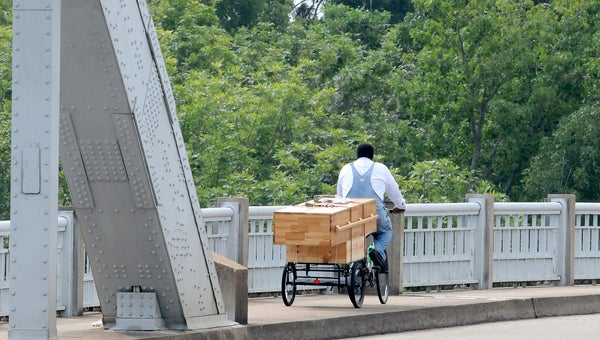Mobile man bikes path to raise awareness of voting rights struggle
Published 10:10 pm Monday, August 5, 2013

Jeffery Jones peddles his bike over the Edmund Pettus Bridge Monday on his way to Montgomery. –Tim Reeves
Jeffery Jones is by no means a bike enthusiast, nor did he enter the trek he is on with tremendous planning and foresight. But, Jones began his bike ride from Marion to Montgomery with the primary focus of raising awareness of voting rights, the impact it has had on America and the problem with the recent Supreme Court decision he said “gutted” the iconic act that turns 50 today.
With a hand-crafted pine box coffin attached to a bike trailer, connected to his bicycle, Jones, a paralegal from Mobile, intends to finish his travel to Montgomery in time for a planned candle-light vigil in Montgomery, honoring the Voting Rights Act and calling on Congress to undo the recent court decision.
“This is not about me, this is not about my generation. This is about raising awareness about the importance of the Voting Rights Act, what it means to African Americans, what it means to all Americans,” Jones said. “These kids, this generation, really does not have a clue the fight that was fought so many years ago to get this act passed. They have no idea. They need to be out here with me, with us, fighting for changes.”
Earlier this year, the U.S. Supreme Court decided to remove a portion of the Voting Rights Act, Section 4 that dealt with those states, those areas that were required to get Justice Department approval before making any changes to voting laws, procedures. Those procedures, those laws, that were part of Section 5, were in essence “gutted” by the court’s decision to remove the criteria for which areas were required to comply.
“We want Section 5 revitalized,” State Sen. Hank Sanders, who has helped organize many of the voting rights anniversary events, planned for Tuesday throughout Alabama, and in other states. “Really, what [Supreme Court] did, they stabbed Section 5 in the back by striking down part of Section 4.”
Marion was the ideal starting point for Jones’ trip in his mind, considering it is the location where an Alabama State Trooper killed Jimmy Lee Jackson, a civil rights activist, on Feb. 26, 1965.
The killing sparked outrage that led to additional protests including the events on March 7, 1965, Bloody Sunday.
It was that event, the beatings and attacks by law enforcement officials on those seeking to march from Selma to Montgomery, that is credited with galvanizing the nation for the need for changes to voting rights and the ultimate writing and passage of the Voting Rights Act of 1965 on Aug. 6.
“Voting, and the ability to cast a vote, is so important. When we vote and elect our leaders it is they who go and make the laws that the police enforce,” Jones said. “People asked me how [George Zimmerman] can be found not guilty for killing Trayvon Martin and I tell them it is the laws that were passed and the elected leaders who passed them.”
Jones said he hopes others rise up with he and others to call for immediate changes to the Voting Rights Act, strengthening what was impacted by the Supreme Court’s decision.
“The voting right is the right that protects all other rights. So, if you lose your voting rights you will eventually lose all of your other rights,” Sanders said. “There’s no right more important than the right to vote. It’s the rights guard. It guards all other rights.”





